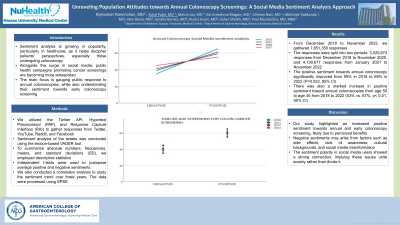Sunday Poster Session
Category: Colorectal Cancer Prevention
P0349 - Unraveling Population Attitudes Towards Annual Colonoscopy Screenings: A Social Media Sentiment Analysis Approach
Sunday, October 22, 2023
3:30 PM - 7:00 PM PT
Location: Exhibit Hall

Has Audio
- AP
Achal Patel, MD
Nassau University Medical Center
East Meadow, NY
Presenting Author(s)
Rajmohan Rammohan, MD, Melvin Joy, MD, Sai Greeshma Magam, MD, Dilman Natt, MD, Tulika Saggar, MD, Achal Patel, MD, Abhishek Tadikonda, MD, Jiten Desai, MD, Sandra Gomez, MD, Rucha Jiyani, MD, Saher Sheikh, MD, Paul Mustacchia, MD, MBA
Nassau University Medical Center, East Meadow, NY
Introduction: Sentiment analysis is growing in popularity, particularly in healthcare, as it helps decipher patients' perspectives, especially those undergoing colonoscopy. Alongside the surge in social media, public health campaigns promoting cancer screenings are becoming more widespread. The main focus is gauging public response to annual colonoscopies, while also understanding their sentiment towards early colonoscopy screening.
Methods: We utilized the Twitter API, Hypertext Preprocessor (PAP), and Response Capture Interface (RAI) to gather responses from Twitter, YouTube, Reddit, and Facebook. Sentiment analysis of the tweets was conducted using the lexicon-based VADER tool. To summarize absolute numbers, frequencies, means, and standard deviations (SD), we employed descriptive statistics. Independent t-tests were used to juxtapose average positive and negative sentiments. We also conducted a correlation analysis to study the sentiment trend over three years. The data were processed using SPSS
Results: From December 2017 to November 2022, we gathered 7,651,350 responses. The responses were split into two periods: 3,520,673 responses from December 2018 to November 2020, and 4,130,677 responses from January 2021 to November 2022. The positive sentiment towards annual colonoscopy significantly improved from 59% in 2018 to 69% in 2022 (P=0.022, 95% CI). There was also a marked increase in positive sentiment toward annual colonoscopies from age 50 to age 45 from 2018 to 2022 (53% vs. 67%, p< 0.01, 95% CI).
Discussion: Our study highlighted an increased positive sentiment towards annual and early colonoscopy screening, likely due to perceived benefits. Negative sentiments may arise from factors such as side effects, lack of awareness, cultural backgrounds, and social media misinformation. The sentiment polarity in social media users showed a strong connection, implying these issues unite society rather than divide it.

Disclosures:
Rajmohan Rammohan, MD, Melvin Joy, MD, Sai Greeshma Magam, MD, Dilman Natt, MD, Tulika Saggar, MD, Achal Patel, MD, Abhishek Tadikonda, MD, Jiten Desai, MD, Sandra Gomez, MD, Rucha Jiyani, MD, Saher Sheikh, MD, Paul Mustacchia, MD, MBA. P0349 - Unraveling Population Attitudes Towards Annual Colonoscopy Screenings: A Social Media Sentiment Analysis Approach, ACG 2023 Annual Scientific Meeting Abstracts. Vancouver, BC, Canada: American College of Gastroenterology.
Nassau University Medical Center, East Meadow, NY
Introduction: Sentiment analysis is growing in popularity, particularly in healthcare, as it helps decipher patients' perspectives, especially those undergoing colonoscopy. Alongside the surge in social media, public health campaigns promoting cancer screenings are becoming more widespread. The main focus is gauging public response to annual colonoscopies, while also understanding their sentiment towards early colonoscopy screening.
Methods: We utilized the Twitter API, Hypertext Preprocessor (PAP), and Response Capture Interface (RAI) to gather responses from Twitter, YouTube, Reddit, and Facebook. Sentiment analysis of the tweets was conducted using the lexicon-based VADER tool. To summarize absolute numbers, frequencies, means, and standard deviations (SD), we employed descriptive statistics. Independent t-tests were used to juxtapose average positive and negative sentiments. We also conducted a correlation analysis to study the sentiment trend over three years. The data were processed using SPSS
Results: From December 2017 to November 2022, we gathered 7,651,350 responses. The responses were split into two periods: 3,520,673 responses from December 2018 to November 2020, and 4,130,677 responses from January 2021 to November 2022. The positive sentiment towards annual colonoscopy significantly improved from 59% in 2018 to 69% in 2022 (P=0.022, 95% CI). There was also a marked increase in positive sentiment toward annual colonoscopies from age 50 to age 45 from 2018 to 2022 (53% vs. 67%, p< 0.01, 95% CI).
Discussion: Our study highlighted an increased positive sentiment towards annual and early colonoscopy screening, likely due to perceived benefits. Negative sentiments may arise from factors such as side effects, lack of awareness, cultural backgrounds, and social media misinformation. The sentiment polarity in social media users showed a strong connection, implying these issues unite society rather than divide it.

Figure: Annual colonoscopy screening social media sentiment analysis
Disclosures:
Rajmohan Rammohan indicated no relevant financial relationships.
Melvin Joy indicated no relevant financial relationships.
Sai Greeshma Magam indicated no relevant financial relationships.
Dilman Natt indicated no relevant financial relationships.
Tulika Saggar indicated no relevant financial relationships.
Achal Patel indicated no relevant financial relationships.
Abhishek Tadikonda indicated no relevant financial relationships.
Jiten Desai indicated no relevant financial relationships.
Sandra Gomez indicated no relevant financial relationships.
Rucha Jiyani indicated no relevant financial relationships.
Saher Sheikh indicated no relevant financial relationships.
Paul Mustacchia indicated no relevant financial relationships.
Rajmohan Rammohan, MD, Melvin Joy, MD, Sai Greeshma Magam, MD, Dilman Natt, MD, Tulika Saggar, MD, Achal Patel, MD, Abhishek Tadikonda, MD, Jiten Desai, MD, Sandra Gomez, MD, Rucha Jiyani, MD, Saher Sheikh, MD, Paul Mustacchia, MD, MBA. P0349 - Unraveling Population Attitudes Towards Annual Colonoscopy Screenings: A Social Media Sentiment Analysis Approach, ACG 2023 Annual Scientific Meeting Abstracts. Vancouver, BC, Canada: American College of Gastroenterology.
